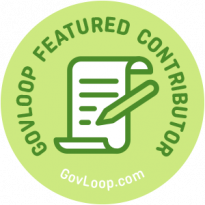Inclusive leadership is driven by leaders who are committed to ensuring all team members are treated equitably, have a sense of belonging, feel valued as part of the organization, and are given all the resources needed to achieve their potential. To do this, inclusive leaders must be aware of their own biases and actively seek out different perspectives as part of decision making.

Drawing from military tradition, government has traditionally been a top-down, order-driven management structure. But this rigid command and control structure is incompatible with the way work gets done today. With Agile methodology moving from software development to business overall, a collaborative, iterative leadership structure is needed to support the quick delivery of programs and solutions that can make an impact on the mission today.
Though not called out specifically in the Executive Order (EO) on Diversity, Equity, Inclusion, and Accessibility in the Federal Workforce, inclusive leadership is a critical piece of the change that the EO seeks. The head of each agency is tasked with making inclusion (along with diversity, equity, and accessibility) a priority in strategic planning moving forward. Similarly, the President’s Management Agenda calls for “promoting diversity, equity, inclusion, and accessibility (DEIA) strategies and practices across all human capital activities” as part of strengthening and empowering the Federal workforce.
Between these mandates for a focus on inclusion and studies showing that inclusive organizations enjoy 90% higher team innovation, 50% higher team performance, and 140% higher team engagement, it is critical for government leaders to focus on building inclusive leadership skills to meet mission demands.
What does an inclusive leader look like?
There are many “top trait” lists found on a Google search of “inclusive leadership traits” but some commonalities among these are:
- Humility: Inclusive leaders know their ideas are not always the best. They are aware of what they know and don’t know and always seek the contributions of others.
- Empathy: A key trait of emotional intelligence, empathy is critical in being inclusive. Empathy is not just about understanding the challenges others face but acting to help overcome barriers.
- Cultural Intelligence: Inclusive leaders are curious about other cultures and work to understand and adapt to cultural norms and needs. This also means understanding existing biases and being willing to change those views.
- Collaborative: With constant communication and feedback, inclusive leaders empower others to take the lead at different times throughout a project. They are able to implement changes introduced by the diverse perspectives shared in frequent communication.
Inclusive leaders make their commitment to developing these traits very visible. They frequently communicate their focus on diversity and inclusion and hold others accountable when they do not embody the spirit of inclusion.
Becoming an inclusive leader
To cultivate these traits, frequent self-reflection can help leaders root out thinking and actions that run counter to inclusive activity. As with any emotional intelligence exercise, journaling, active listening, and seeking feedback can help nurture inclusive leadership traits. In fact, one recommendation is to establish a diverse personal advisory board (PAD). This is a group of colleagues that has frequent contact with the leader. They must be counted on to “shoot straight” as their role is to give feedback on everyday behaviors including giving equal time to people in meetings, use of one gender pronoun over another when referring in the abstract (the sales guys, the administrative ladies, etc.), and use of imagery (sports metaphors, religious-based) that not everyone in the group may understand.
Inclusivity is just one element of DEIA, but it is a critical component to meeting the overall goals of creating a workforce that works for everyone. A team can be incredibly diverse with people from multiple races, creeds, and backgrounds, but, if the richness of that diversity is not appreciated and used in everyday decision-making, then it is just a checkbox rather than driving the overall goals of innovation and team success.
As the founder of GovEvents and GovWhitePapers, Kerry is on a mission to help businesses interact with, evolve, and serve the government. With 25+ years of experience in the information technology and government industries, Kerry drives the overall strategy and oversees operations for both companies. She has also served in executive marketing roles at a number of government IT providers.





Leave a Reply
You must be logged in to post a comment.